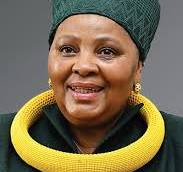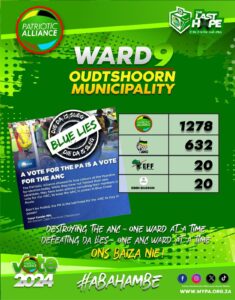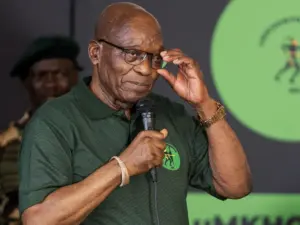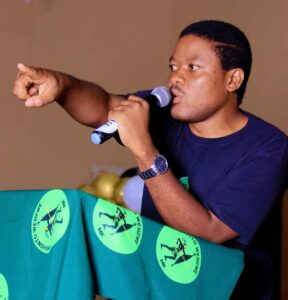By: Clyde N.S Ramalaine
This week, 19 March the Eastrand Bedfordview residence of the Speaker of Parliament and ANC Member of Parliament, Nosiviwe Mapisa-Nqakula was subjected to a search-and-seizure operation, amidst swirling speculations of an impending arrest, expected this past Friday but ultimately did not materialize. This turn of events unfolded as Mapisa-Nqakula swiftly brought forth an urgent interdict against key figures, including the National Director of Public Prosecutions (NDPP), Advocate Shamila Batohi, and the Police Minister, Bheki Cele, along with the entities they represent.
It is crucial to understand the foundation upon which Mapisa-Nqakula’s rationale for the urgent interdict is constructed. She asserts that neither she nor her legal representatives were notified of any impending search-and-seizure operation or the purported warrant for her arrest. Moreover, she emphasizes the potential irreparable harm that her arrest and subsequent prosecution could inflict upon her distinguished career and life’s mission.
Mapisa-Nqakula’s urgent interdict aims to forestall her imminent arrest and prosecution, as demonstrated by her recent submission of a comprehensive 94-page document in support of her application. This legal artifice signals her cognizance of the ongoing investigation, a matter she was well aware of during her tenure as Minister of Defence. However, the timing of her interdict following the raid on her premises on March 19, 2024, suggests a potential oversight or miscalculation regarding the likelihood of such legal actions being taken against her. Central to her plea is the demand for access to all relevant information, ostensibly to mitigate irreparable harm to her reputation. Significantly, this encompasses not only exculpatory evidence but also documents pivotal in orchestrating the aforementioned search and seizure operation.
A critical analysis of Mapisa-Nqakula’s interdict raises broader considerations regarding its ramifications on prosecutorial prerogatives and the equitable dispensation of legal mechanisms. The invocation of similar endeavours, notably by the former now-late Police Commissioner Jackie Selebi, prompts scrutiny into the inherent tensions between individual rights and law enforcement imperatives. Furthermore, the perception of disparate treatment based on socio-political status raises pertinent questions about the fairness and integrity of legal proceedings. Consequently, while Mapisa-Nqakula’s legal strategy may offer a transient respite, it underscores deeper systemic issues concerning access to justice and the impartial administration of the law.
Mapisa-Nqakula’s pursuit of an urgent interdict not only underscores her immediate legal objectives but also suggests a strategic ruse aimed at prolonging the legal process. This approach finds precedence in the handling of the intended arrest of Ace Magashule, where pre-emptive media engagement compelled the National Prosecuting Authority (NPA) to reassess its initial plans.
I vividly recall receiving a call on that Tuesday, from an ANC and Ace Magashule sympathizer asking me for my thoughts and strategy, to which I responded, that if Ace knew he would be arrested by Friday in the typical Hollywood drama that the NPA at the time came to be known for, he should get the media to publicize it to call the bluff of the NPA. The same was done, and the NPA swallowed its own words, denying there was ever any warrant of arrest for Ace Magashule. Despite initially refuting the existence of a warrant for Magashule’s arrest, subsequent events revealed a reversal in the NPA’s position, culminating in his apprehension six weeks later without the anticipated media spectacle. This parallel highlights the potentially dilatory nature of Mapisa-Nqakula’s legal actions, prompting questions about the efficacy of such tactics in navigating the intricacies of legal proceedings and shaping public perceptions.
Mapisa-Nqakula’s assertion that the search-and-seizure operation, along with the purported warrant of arrest, is politically motivated, while convenient, gains significance when considering the intricate dynamics within the African National Congress (ANC). The allegations leveled against her, as brought by a defense contractor, contend that she benefited from large sums of money which she demanded. Additionally, for some, her husband, Charles Nqakula, who formerly served as an advisor to President Cyril Ramaphosa until he was subsequently replaced by Sidney Mufamadi, may also play into this. This transition, coupled with other ripples around Mapisa-Nqakula, coincided with a broader crisis of corruption engulfing the ANC, which has irked many South Africans and eroded public trust in the party. Notably, corruption has become a pervasive issue within the ANC, and it is often wielded purposefully and, at times, factionally under Ramaphosa’s leadership. This complex interplay of political power, personal associations, and the endemic corruption plaguing the ANC underscores the contentious backdrop against which Mapisa-Nqakula’s claims of political targeting must be considered.
The pending arrest, which I hold will occur soon, of Speaker Mapisa-Nqakula, a figure embroiled in various controversies, notably the use of a military flight for personal purposes, extends beyond mere legal implications. In 2016 it was reported that the then Defence Minister Nosiviwe Mapisa-Nqakula smuggled a Burundian woman with a false passport into South Africa on an Air Force jet. This was admitted by Mapisa-Nqakula in her then Sunday Times interview, she maintained a defiant stance on actions and denied she had abused her power, saying: “I’d do it again if I had to.” As per the published media reports, Mapisa-Nqakula admitted to flying from Waterkloof Air Force Base to the Democratic Republic of Congo in 2014 to retrieve Michelle Wege, who had been detained at Kinshasa International Airport for attempting to board a flight with fraudulent documents allegedly organized by Mapisa-Nqakula’s sister. Wege’s fake passport identified her as a Congolese national named Amina Yambayamba, arousing suspicion due to her inability to speak French or regional languages. Mapisa-Nqakula, accompanied by a delegation including a high-ranking air force official, negotiated Wege’s release and subsequently travelled with her to a conference in Addis Ababa before returning to South Africa. Mapisa-Nqakula’s sister, then South Africa’s deputy ambassador to Burundi, was later suspended for her involvement in obtaining the fraudulent documents.
It would appear that Mapisa-Nqakula’s rapport with Ramaphosa deteriorated when the president imposed a three-month salary deduction upon her, subsequent to revelations that she had provided transportation for an ANC delegation via a South African National Defence Force (SANDF) jet to convene with their Zanu-PF counterparts in Zimbabwe in September.

On May 9, 2021, news reports indicated that former Minister of Safety and Security, Charles Nqakula, had resigned from his position as President Cyril Ramaphosa’s national security adviser. Speculation arose regarding a potential cabinet reshuffle involving Ramaphosa’s wife, Nosiviwe. Nqakula, who had been appointed by Ramaphosa in June 2018, previously served as the general secretary of the South African Communist Party (SACP), succeeding the late party leader Chris Hani. Acting presidential spokesperson Tyrone Seale confirmed Nqakula’s resignation, citing “personal reasons” as the cause. Seale further stated that although Nqakula had stepped down from full-time employment, he expressed a willingness to continue providing advisory support to the president. Seale clarified that no vacancy had arisen as the appointment of advisers remained within the prerogative of the president. Thus, the resignation of Charles Nqakula, while mentioned by many, may not be a significant matter, but rather attention should be focused on the actions and inactions of Mapisa-Nqakula as an individual.
Acting Minister in the Presidency, Khumbudzo Ntshavheni, challenged Mapisa-Nqakula’s assertion, emphasizing that the facts did not support her viewpoint. Mapisa-Nqakula subsequently conceded during a briefing at the SA Police Service training academy in Durban that it was indeed an attempted insurrection, clarifying that her earlier use of the term counter-revolution was not intended to contradict the President but rather to highlight the undermining of state authority. She emphasized her role as a member of the National Security Council and stated that there was no deliberate attempt to contradict the President. Meanwhile, Ntshavheni reported progress in arrests of alleged instigators of the violence and efforts to restore economic activity, with major routes and economic nodes operational, though the death toll from the unrest stands at 215. In Gauteng, the situation has stabilized, and efforts for clean-up and business continuity are underway, with key transportation networks gradually returning to operation.
The NPA’s search-and-seizure and the very real warrant on Mapisa-Nqakula, occurring virtually two months before South Africa’s seventh national elections, where the ANC appears more vulnerable than ever before, sends conflicting signals that have ramifications for the ANC, regardless of how it may want to deny it.
It prompts us to consider broader political dynamics and motivations. Particularly noteworthy is her elevation to the role of Speaker following the July 2021 unrest, despite the calls for the dismissal of multiple officials including Nqakula herself, Cele, and Dlodlo. This promotion begs the question: what interests and whose agenda propelled her to this position?
It is evident that Cyril Ramaphosa recognized Mapisa-Nqakula’s compromised status when he chose to promote her strategically positioning her as Speaker, thereby ensuring her allegiance in defending the ruling Ramaphosa ANC’s interests within Parliament. Her influence was conspicuous in pivotal events such as the extraordinary impeachment proceedings instituted against Public Protector Mkhwebane and Judge Hlophe to name as observables. However, her defiance in entertaining the establishment of a Section 89 Panel on Phala Phala, yielding to the removal of academic Richard Calland a known Ramaphosa supporter as panelist and risking the unfavourable findings against Ramaphosa to stand could not have augured well with Ramaphosa. Ultimately she also stewarded Parliament’s choices to reject its own initiated Section 89 Panel all in the interest of Ramaphosa’s second-termism.
Nqakula’s subsequent efforts to shield Ramaphosa in what some Opposition parties considered manipulating Parliament to ensure no secret ballot in vote was entertained, and the subsequent rejection of the panel’s report underscore her loyalty to the ruling faction. While her legal culpability in the NPA’s case of corruption against her should not be overlooked, the overarching narrative reveals a politically orchestrated spectacle aimed at making an example of her, particularly regarding her stance in instituting the Section 89 panel, succumbing to the pressure to have Richard Calland who was the third panelist removed in September 2022. This episode portrays her as obstinate in the face of political pressure.
Some in the ANC might admonish Mapisa-Nqakula, urging her to reflect on those she may have stepped on, disregarded, or harmed in her ascent to ANC and SA political office and power, including figures such as the late Mama Winnie Mandela. It is pertinent to consider the individuals whom she may have neglected, ignored, or treated callously when she now seeks to attribute her forthcoming arrest on corruption charges solely to political motivations.









